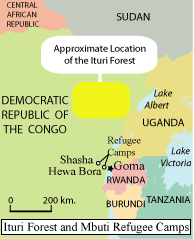The Mbuti of eastern Congo are living in desperate conditions, in squalid refugee camps, according to a news release last week from UNHCR, the office of the United Nations High Commissioner for Refugees. Bylined Goma, capital of the North Kivu Province, the story is most depressing: the Mbuti appear to be suffering from the effects of the interminable wars in eastern Democratic Republic of the Congo more than virtually any other group of people.
The report estimates that around 10,000 Mbuti, two thirds of the total population estimated 25 years ago, now live in dozens of camps scattered about the province, refugees from fighting in the Ituri Forest where they traditionally lived. They lack most basic services and have little if any hope of soon being able to return to their forest homes and way of life.
Their culture and traditions are threatened. Other ethnic groups across the province discriminate against them, and attempts to help them by humanitarian agencies have not amounted to anything. Karl Steinacker, who coordinates the UNHCR work in eastern D.R. Congo, says that they are suffering more than other displaced peoples. He believes his agency’s challenge is to help them integrate into the surrounding society, to “prevent the Pygmies from becoming the real losers of this war.” Evidently, ending the fighting in the Ituri Forest, their homeland, is not an option.
 Muhindo Mupepe, an Mbuti representative at the Hewa Bora camp, about 16 km west of Goma, says that they sleep on bare, volcanic rock, the outflows of volcanoes in the area. “Our life here is one of suffering,” he said. “We don’t get any assistance like the other displaced people. When our children fall ill, we have to go and search for medicinal plants in the forest.” The photo that accompanies the story shows a man seated in front of a hut made of sticks with a spectacular, but bleak looking, volcanic landscape in the background.
Muhindo Mupepe, an Mbuti representative at the Hewa Bora camp, about 16 km west of Goma, says that they sleep on bare, volcanic rock, the outflows of volcanoes in the area. “Our life here is one of suffering,” he said. “We don’t get any assistance like the other displaced people. When our children fall ill, we have to go and search for medicinal plants in the forest.” The photo that accompanies the story shows a man seated in front of a hut made of sticks with a spectacular, but bleak looking, volcanic landscape in the background.
The reporter visited another Mbuti camp, Shasha, located in the Masisi district, a rolling, agricultural area about 50 km northwest of Goma. But if anything, conditions are even worse there than at Hewa Bora. About 280 Mbuti living there lack sufficient food, health care, clothing, household goods, or adequate shelter. Their children cannot go to a basic school in the area because they have no money to pay the required fees. One old man pointed to his ragged jacket and told the reporter, “this is my clothing, my blanket and my sleeping mat—it’s all I’ve got left.”
An Mbuti spokesman, Secper Asumani, expressed his frustration that no one had bothered to help them, despite several surveys of their needs by various organizations. In order to survive, their children have become bandits, creating problems for local residents. The Mbuti work for local farmers doing backbreaking labor for miniscule pay. They also forage in the forest for wood to cut and sell as fuel. This is especially dangerous for the women because armed gangs also forage in the forests, take any wood if they catch the Mbuti, and frequently rape the women as well.
The article argues that the Mbuti simply cannot return to their own forests. Instead, the UNHCR is lobbying the government on their behalf so they can gain access to lands where they have resettled and can become integrated into the local agricultural communities. The agency is supporting the construction of shelters, agricultural training, and projects that will generate income.
This dispersal into the resettlement areas will of course destroy the forest-based Mbuti culture. The peacefulness that Colin Turnbull described in their society 40 years ago may be gone by now in the resettlement camps, though the article did not deal with that issue.
But Mr. Mupepe, the Mbuti spokesperson in Hewa Bora, told the reporter that his people were starting to adapt. “In the past, we did not have the chance to study, but we [now] ask that our children can go to school. Perhaps one day,” he added hopefully, “one of them will be among the leaders of the country.”